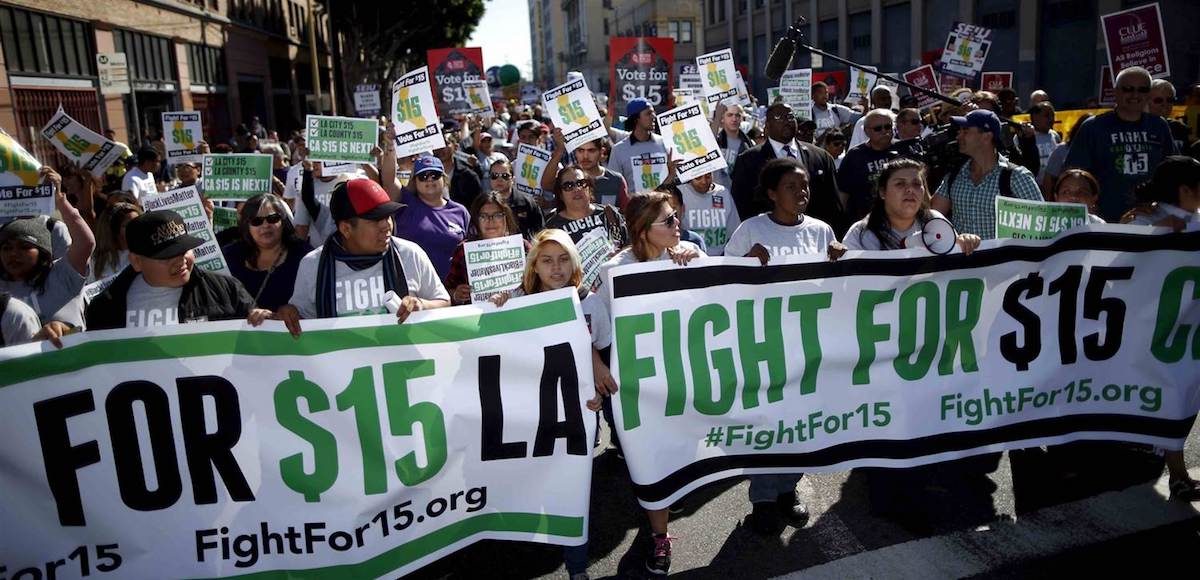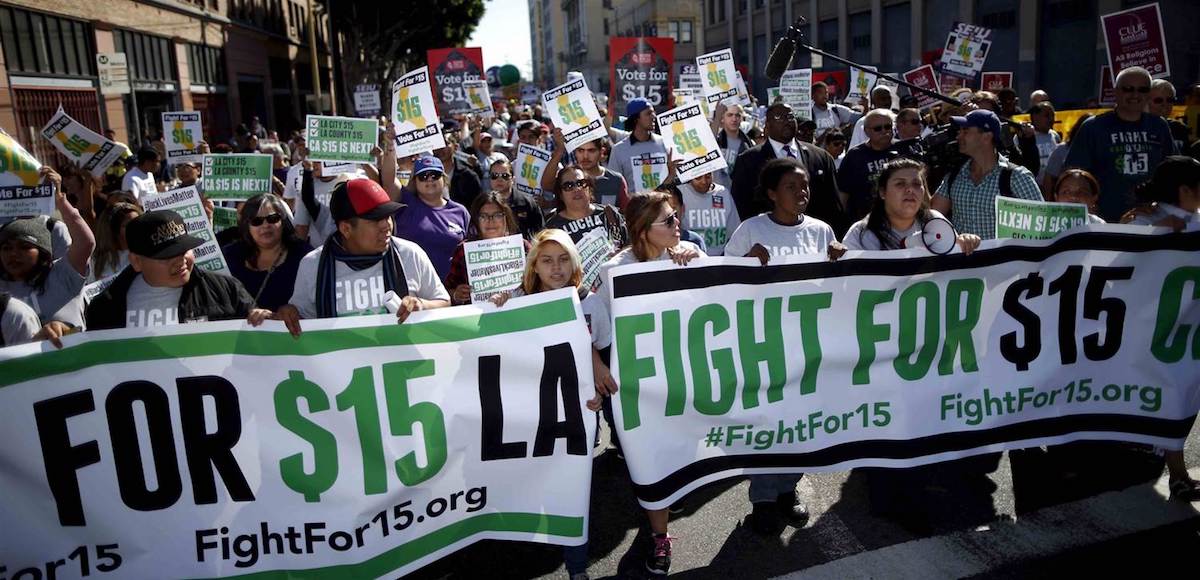

Fast-food workers and their supporters join a nationwide protest for higher wages and union rights in Los Angeles, California, United States, in this file photo taken November 10, 2015. (Photo: Reuters)
In addition to his exemplary work as a Senior Fellow for the Cato Institute, Johan Norberg narrates some great videos for Free to Choose Media. Here are some that caught my eye.
- The foolish and counterproductive War on Drugs.
- A grim consequence of Cuban communism.
- The real lesson to learn from Sweden.
But my favorite video, which I shared back in January, is his concise explanation of why policy makers should focus on fighting poverty rather than reducing inequality.
I’m posting it again to set the stage for a discussion on inequality and fairness.
Now let’s dig into the main topic for today.
A study by three academics from Yale’s Department of Psychology concludes that people want fairness rather than equality.
…there is no evidence that people are bothered by economic inequality itself. Rather, they are bothered by something that is often confounded with inequality: economic unfairness. Drawing upon laboratory studies, cross-cultural research, and experiments with babies and young children, we argue that humans naturally favour fair distributions, not equal ones, and that when fairness and equality clash, people prefer fair inequality over unfair equality.
My former grad school classmate Steve Horwitz wrote about the aforementioned study
…what we really care about is something other than inequality per se. We care about upward mobility, or average income overall, or how well the least well off do. …A recent study in Nature argued, with evidence, that what bothers people more than inequality per se is “unfairness.” People will accept inequality if they feel the process that produced it is fair. …when I give talks about inequality. I point out the number of Apple products visible in the room and ask them if they think the wealth Steve Jobs and other Apple founders accumulated over their lifetimes was objectionable. Is that the kind of inequality they object to? Students are usually hard-pressed to articulate why Jobs’ wealth is wrong… I also remind them that economic studies show that only about 4% of the total benefits of innovation accrue to the innovator. The rest goes to consumers.
Steve cites Nozick and Hayek to bolster his argument before then making the key point that markets produce material abundance based on genuine fairness.
As Robert Nozick argued in Anarchy, State, and Utopia: if each step in the evolution of the market is fair by itself, how can the pattern of income that emerges be unfair? …Hayek…observed in The Constitution of Liberty that if we want equality of outcomes, we will have to treat people unequally. If, however, we treat people equally, we will get unequal outcomes. Hayek’s argument was premised on the fact that human beings are not equal in our native intelligence, strength, skills, and abilities. …If people really care about fairness, then supporters of the market should be insisting on the importance of equality before the law. …Equality of outcomes requires that we treat people differently, and this will likely be perceived as unfair by many. Equality before the law corresponds better with notions of fairness even if the outcomes it produces are unequal. …If what appear to be concerns about inequality are, in fact, concerns about unfairness, we have ways of addressing them that demonstrate the power of exchange and competitive markets. Markets are more fair because they require that governments treat us all equally and that none of us have the ability to use political power to protect ourselves from the competition of the marketplace and the choices of consumers. In addition, market-based societies have been the best cure for poverty humans have ever known.
Writing for CapX, Oliver Wiseman analyzes other scholarly research on equality and fairness.
A 2012 study by behavioural economists Dan Ariely and Mike Norton generated some attention for demonstrating that Americans wanted to live in a more equal country. But more equal is not the same thing as fully equal. …if you let people choose between equal and unequal societies – and then tell them that they themselves will be assigned a level of wealth within it completely at random – most people choose inequality. And that preference is observable across the political spectrum, in different countries and at a range of ages.
But people don’t want undeserved inequality since that is the result of unfair interventions (i.e., cronyism).
This paper’s conclusions help explain much of the outcry over economic inequality in recent years. Occupy Wall Street and the very idea of the “one per cent” emerged just after the financial crisis plunged much of the world into recession, and US and British banks were handed billion-dollar bailouts to steady the ship. The anger didn’t come from the fact that bankers were so well paid. It came from the perception that they’d made that money by piling up risk rather than being particularly clever or hard-working – risk that was now being underwritten by the taxpayer. The wealth wasn’t just distributed unequally, but unfairly. The market mechanisms that most people accepted as the rules of the economic game suddenly seemed rigged. …Voters, in other words, don’t want equality – they want fairness. …As the Soviets found, true economic equality cannot be accommodated within a system that allows people tolerable levels of economic and political freedom. But fairness, by contrast, is something capitalism can – and should – deliver.
Professor Tyler Cowen of George Mason University cites some additional academic research buttressing the conclusion people don’t object to fair types of inequality.
…most Americans don’t mind inequality nearly as much as pundits and academics suggest. A recent research paper, by Graham Wright of Brandeis University, found that polled attitudes about economic inequality don’t correlate very well with the desire for government to address it. There is even partial evidence, once controls are introduced into the statistics, that talk of inequality reduces the support for doing something about it. …It’s not obvious why such counterintuitive results might be the case. One possibility is that…talk about economic inequality increases political polarization, which lowers the chance of effective action. Or that criticizing American society may cause us to feel less virtuous, which in turn may cause us to act with less virtue. …A variety of other research papers have been showing that inequality is not a major concern per se. One recent study by Matthew Weinzierl of Harvard Business School shows that most Americans are quite willing to accept economic inequality that stems from brute luck, and that they are inclined to assume that inequality is justified unless proved otherwise.
Last but not least, Anne Bradley of the Institute for Humane Studies augments this analysis by explaining the difference between ethical market-driven inequality versus unfair cronyist-caused inequality.
The question of whether income inequality is bad hinges on the institutions within that society and whether they support entrepreneurship and creativity or thuggery and exploitation. Income inequality is good when people earn their money by discovering new and better ways of doing things and, through the profit mechanism, are encouraged to bring those discoveries to ordinary people. …Rising incomes across all income groups (even if at different rates) is most often the sign of a vibrant economy where strangers are encouraged to serve each other and solve problems. Stagnant incomes suggest something else: either a rigged economy where only insiders can play, or an economy where the government controls a large portion of social resources, stalling incomes, wealth, and wellbeing.
She includes a very powerful example of why it can be much better to live in a society with high levels of (fair) inequality.
Consider the following thought experiment: knowing nothing other than the Gini index scores, would you rather live in a world with a Gini of .296 (closer to equality) or .537 (farther from equality)? Many people when asked this question choose the world of .296. These are the real Gini scores of Pakistan (.296) and Hong Kong (.537). If given the choice, I would live in Hong Kong without thinking twice. Hong Kong has a thriving economy and high incomes, and it is the world leader in economic freedom. The difference between these two countries could not be more striking. In Pakistan, there might be more income equality, but everyone is poorer. It is difficult to emerge out of poverty in Pakistan. Hong Kong provides a much richer environment where people are encouraged to start businesses, and this is the best hope for rising incomes, or income mobility.
Her example of Hong Kong and Pakistan is probably the most important takeaway from today’s column.
Simply stated, it’s better to be poor in a jurisdiction such as Hong Kong where there is strong growth and high levels of upward mobility. Indeed, I often use a similar example when giving speeches, asking audiences whether poor people are better off in Hong Kong, which has only a tiny welfare state, or better off in nations such as France and Greece, which have bloated welfare states but very little economic dynamism.
The answer is obvious. Or should be obvious, at least to everyone who wants to help the poor more than they want to punish the rich (and there are plenty in the latter camp, as Margaret Thatcher explained).
And I’m now going to add my China example to my speeches since inequality dramatically increased at the same time that there was a stupendous reduction in poverty.
Once again, the moral of the story should be obvious. Focus on growth. Yes, some rich people will get richer, but the really great news is that the poor will get richer as well. And so long as everyone is earning money through voluntary exchange rather than government coercion, that also happens to be how a fair economy operates.






